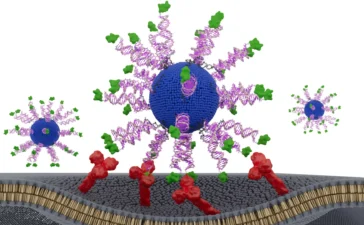Patrick Sullivan, MD, FRANZCP, the Yeargan Distinguished Professor of Psychiatry and Genetics at the UNC School of Medicine, and researchers at the Karolinska Institutet in Stockholm, Sweden, have developed a comprehensive outline of the genetics of schizophrenia. The review was published in Nature Reviews Neuroscience.
Schizophrenia is a neuropsychiatric disorder featuring recurrent episodes of psychosis — such as hallucinations, delusions, and disorganized thinking — with many patients developing apathy, social withdrawal, and poor emotional control as a result.
Because schizophrenia has been known to run in families for centuries, researchers have turned to genetic testing and analyses to identify risk factors for the condition. Recent genomic research on schizophrenia has identified nearly 300 common genetic variants and over 20 rare variants as significant risk factors for the disorder.
These discoveries have emerged from extensive genome-wide association studies, whole-exome sequencing, and other analyses. Simultaneously, studies of the functional organization of the brain have shed light on the intricate cellular composition and interconnections of the brain in both neurotypical individuals and those with schizophrenia.
These findings reveal a surprising complexity in the mechanisms underlying schizophrenia, emphasizing the role of multiple genes rather than single-gene causation. This “polygenicity” highlights a mechanism that remains challenging to fully understand due to the lack of robust theoretical frameworks and experimental tools. Sullivan and colleagues reviewed these issues and provided ideas for a path forward in the Nature Reviews Neuroscience article.
However, Sullivan and colleagues stress that environmental factors (including lifestyle, drug use, poverty, stress, and complications at birth) are also relevant in addition to genomic risk. Although these factors are more difficult to study compared to the genome, this genetic information is important for researchers to consider because some environmental factors are modifiable.
“The findings to date resoundingly indicate complexity,” wrote Sullivan, who is also director of the UNC Center for Psychiatric Genomics and the UNC Suicide Prevention Institute. “Rather than being a deterrent to future research, this knowledge underscores the importance of accepting schizophrenia as a genetic and environmental enigma and scaling our research accordingly in our efforts improve the lives of those impacted by schizophrenia.”
You Might Also Like
“Celtic curse” hotspots found in Scotland and Ireland with 1 in 54 at risk
People with roots in the Outer Hebrides and north west Ireland face the highest known risk of developing hemochromatosis, a...
This reengineered HPV vaccine trains T cells to hunt down cancer
Over the last decade, scientists at Northwestern University have identified a key insight about how vaccines work. The ingredients matter,...
This planet friendly diet could cut your risk of early death by 23%
New research from Aarhus University suggests that the updated Nordic dietary guidelines, created to support both personal health and environmental...
Scientists discover protein that rejuvenates aging brain cells
Scientists at the Yong Loo Lin School of Medicine at the National University of Singapore have identified a protein that...









